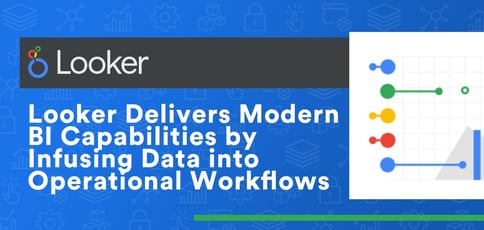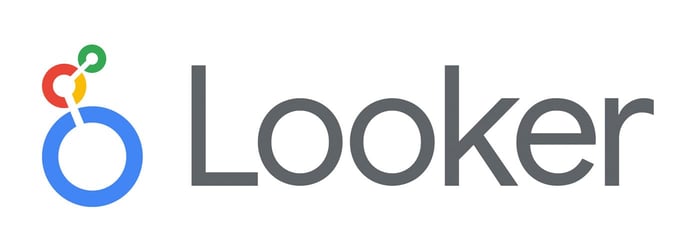
TL; DR: Looker’s unified data platform, now part of Google Cloud, unlocks actionable insights that businesses can use to foster a curiosity-driven culture. The cloud-hosted solution modernizes business intelligence (BI) with a web-based software stack, an agile development environment, and self-service data discovery. With Looker, employees across all departments and industries can make data-driven decisions regardless of their skill level as a data analyst.
Once considered merely nice to have, robust data analytics programs are quickly becoming essential for businesses competing in the 21st century.
Companies in nearly every industry are using data to drive better decision-making processes. Manufacturers use it to prevent overstocking. Healthcare professionals depend on it to identify at-risk patients. Retailers use it to create personalized shopping experiences — the list goes on.
Ultimately, organizations that take big data seriously have an opportunity to facilitate a more efficient business environment, boosting revenue. Those that do not risk becoming relics of the past.
“Today, every business needs data — it’s hard to think of a job that can’t be enhanced with it,” said Pedro Arellano, Director of Outbound Product Management for Looker at Google Cloud.

Looker’s BI platform helps businesses and developers leverage data to their advantage.
Looker, which recently became part of Google Cloud, allows users with or without expertise in business intelligence (BI) to extract value from data at scale. Companies can then transform these insights into better end-user experiences.
“Looker breaks down barriers to data-driven insights via a platform that delivers modern BI capabilities for users without requiring specialized expertise,” Pedro said. “People with varying levels of technical background are using the platform to deliver actionable business insights at key decision-making points, create new value streams, and infuse data into products and workflows.”
Looker modernizes traditional BI. The platform’s self-service discovery experience, for example, makes it easy to explore massive datasets without leaving the browser. A simplified, web-hosted stack works with the platform’s in-database architecture to bridge the last mile of analytics, where insights are transformed into action.
Finally, an agile development environment enables programmers and data scientists to model data and create enhanced end-user experiences.
Fulfilling the Need for Secure and Accessible BI
Looker, headquartered in Santa Cruz, California, was founded in 2012 by Lloyd Tabb and Ben Porterfield. Pedro said that, at the time, the BI and analytics market offered customers one of two choices.
“On one hand, you had traditional, or legacy, BI platforms, which delivered robust capabilities and strong data governance,” he said. “But they were heavily IT-oriented and didn’t give end users the ability to work with data on their own. This resulted in frustrated users who needed to move their businesses faster than their BI tools could support.”
The other option, early data visualization tools, provided specialized analysts an avenue for working with data independently of IT teams. Unfortunately, these solutions came at the expense of essential considerations like data governance.
With the popularity of data-generating business apps giving rise to a more data-oriented workforce, Looker’s co-founders aimed to bring a third option to the market. The result was a safe and secure BI and analytics platform that nearly anyone could use.
Today, the platform — which fits seamlessly into business workflows and third-party systems for a secure but user-friendly experience — is more relevant than ever.
“The average company has over 2,000 Software-as-a-Service (SaaS) applications running their business and generating massive volumes of data every day,” he said. “Workers across the organization, regardless of role or technical expertise, need data to do their jobs.”
Helping Orgs Make Data-Driven Decisions at Scale
Though new roles like chief data officer, data steward, and data scientist are increasingly common, businesses now expect employees in all departments to work with data, regardless of skill level.
Pedro told us that Looker is committed to making continuous improvements to the benefit of such data newbies. In 2020, for example, the company revamped its dashboards, making several enhancements to the Explore module.
This year, Looker will continue working on capabilities that simplify the BI experience for users while helping them dive more deeply into data analysis. The company is continuing to invest in its no-code self-service experience, enabling end users to build analytic workflows and conduct analyses with less effort.

The flexible platform is compatible with a range of cloud hosting solutions and databases.
“We are working on several features that will make it easier for new users to get started while helping everyone find valuable insights,” Pedro said. “We are also integrating with Google Workspace to give people the ability to interact with data outside of the Looker interface.”
Looker currently serves a diverse user base of more than 2,000 organizations spanning the finance, retail, technology, and communications industries. Well-known clients include Asana, Etsy, Kickstarter, Sony, and Warby Parker.
“Looker is a customizable platform that enables customers to build all types of data-driven experiences,” Pedro said. “Nearly half of our customers use Looker to support use cases that fall outside conventional BI, and we’re very excited to push this vision further in 2021 and beyond.”
Keeping Pace with a Rapidly Evolving Analytics Space
Looker recognizes that various professionals work with information in different ways. That’s why the team is continuously focused on making its development platform as programmer-friendly as possible.
“Over the years, we have released new tools and features to make our development platform easier to use,” Pedro said. “This year, we’ll continue investing in our extension framework, API, and developer portal, as well as the Looker Marketplace.”
Developers also have the freedom to choose the data stack that works best for them. The platform is compatible with a range of cloud hosting solutions. It’s also database-agnostic, supporting native integration with leading cloud data warehouses like Google BigQuery, AWS Redshift, and Azure SQL DW.
Looker’s development platform helped one of the company’s biggest customers build a custom data solution for its client base of 200 million users. The powerful product now allows that customer to run more than 10,000 queries per minute in Looker with results in less than three seconds.
Moving forward, Looker will continue to focus on delivering developer-friendly capabilities that help its customers achieve their goals.
“We will continue to invest in our application development platform to help organizations improve their competitive advantage and drive new revenue growth at a reduced development cost,” Pedro said.
A Recent Integration with Google Cloud Platform
Looker’s new home within the Google Cloud Platform (GCP) will allow the company to push the capabilities of its platform even further.
“By integrating into the broader GCP infrastructure, we will be able to offer additional controls to enable customers to deploy scalable and secure analytics environments with confidence,” Pedro said. “We are especially excited about bringing GCP’s best-in-class artificial intelligence and machine learning features into Looker.”
The company is currently investing in augmented analytics and natural language processing tools that will have the ability to predict future outcomes instead of merely analyzing data on events that have already occurred.
“The possibilities are endless, but our team focus never wavers from building the features that are going to be the most beneficial to our customers,” Pedro said.
HostingAdvice.com is a free online resource that offers valuable content and comparison services to users. To keep this resource 100% free, we receive compensation from many of the offers listed on the site. Along with key review factors, this compensation may impact how and where products appear across the site (including, for example, the order in which they appear). HostingAdvice.com does not include the entire universe of available offers. Editorial opinions expressed on the site are strictly our own and are not provided, endorsed, or approved by advertisers.
Our site is committed to publishing independent, accurate content guided by strict editorial guidelines. Before articles and reviews are published on our site, they undergo a thorough review process performed by a team of independent editors and subject-matter experts to ensure the content’s accuracy, timeliness, and impartiality. Our editorial team is separate and independent of our site’s advertisers, and the opinions they express on our site are their own. To read more about our team members and their editorial backgrounds, please visit our site’s About page.

